Filter by
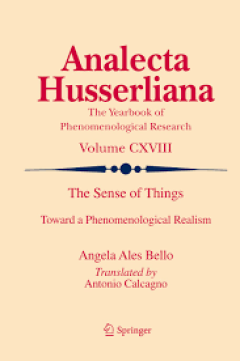
The Sense of Things Toward a Phenomenological Realism
This book proposes a new interpretative key for reading and overcoming the binary of idealism and realism. It takes as its central issue for exploration the way in which human consciousness unfolds, i.e., through the relationship between the I and the world—a field of phenomenological investigation that cannot and must not remain closed within the limits of its own disciplinary borders. The b…
- Edition
- -
- ISBN/ISSN
- 978-3-319-15395-7
- Collation
- -
- Series Title
- -
- Call Number
- -

The Great Council of Malines in the 18th century
This work studies the Great Council of Malines as an institution. It analyzes the Council’s internal organization and staff policy, its position within the broader society of the Austrian Netherlands, the volume and nature of litigation at the Council and its final years and ultimate demise in the late 18th and early 19th century. By means of this institutional study, this volume provides ins…
- Edition
- 1
- ISBN/ISSN
- 978-3-319-09638-4
- Collation
- XVII, 348, 18 illustrations in colour
- Series Title
- Studies in the History of Law and Justice
- Call Number
- -

The Phenomenological Critique of Mathematisation and the Question of Responsi…
This edited collection discusses phenomenological critiques of formalism and their relevance to the problem of responsibility and the life-world. The book deals with themes of formalization of knowledge in connection to the life-world, the natural world, the history of science and our responsibility for both our epistemic claims and the world in which we live. Readers will discover critiques…
- Edition
- -
- ISBN/ISSN
- 978-3-319-09828-9
- Collation
- X, 223
- Series Title
- Contributions to Phenomenology
- Call Number
- -
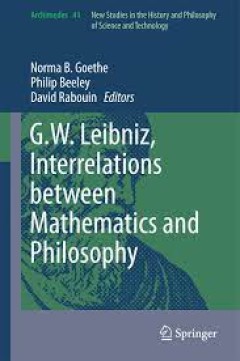
G.W. Leibniz, Interrelations between Mathematics and Philosophy
Up to now there have been scarcely any publications on Leibniz dedicated to investigating the interrelations between philosophy and mathematics in his thought. In part this is due to the previously restricted textual basis of editions such as those produced by Gerhardt. Through recent volumes of the scientific letters and mathematical papers series of the Academy Edition scholars have obtained …
- Edition
- -
- ISBN/ISSN
- 978-94-017-9664-4
- Collation
- -
- Series Title
- -
- Call Number
- -

The Great Council of Malines in the 18th century
This work studies the Great Council of Malines as an institution. It analyzes the Council’s internal organization and staff policy, its position within the broader society of the Austrian Netherlands, the volume and nature of litigation at the Council and its final years and ultimate demise in the late 18th and early 19th century. By means of this institutional study, this volume provides ins…
- Edition
- -
- ISBN/ISSN
- 978-3-319-09638-4
- Collation
- XVII, 348
- Series Title
- Studies in the History of Law and Justice
- Call Number
- -
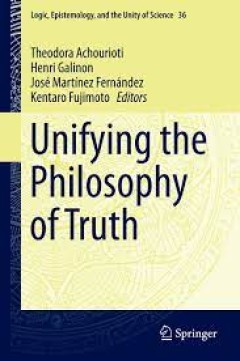
Unifying the Philosophy of Truth
This anthology of the very latest research on truth features the work of recognized luminaries in the field, put together following a rigorous refereeing process. Along with an introduction outlining the central issues in the field, it provides a unique and unrivaled view of contemporary work on the nature of truth, with papers selected from key conferences in 2011 such as Truth Be Told (Amster…
- Edition
- -
- ISBN/ISSN
- 978-94-017-9673-6
- Collation
- 30 b/w illustrations
- Series Title
- -
- Call Number
- -

Leibniz’s Metaphysics and Adoption of Substantial Forms: Between Continuity…
This anthology is about the signal change in Leibniz’s metaphysics with his explicit adoption of substantial forms in 1678-79. This change can either be seen as a moment of discontinuity with his metaphysics of maturity or as a moment of continuity, such as a passage to the metaphysics from his last years. Between the end of his sejour at Paris (November 1676) and the first part of the Ha…
- Edition
- -
- ISBN/ISSN
- 978-94-017-9956-0
- Collation
- -
- Series Title
- -
- Call Number
- -

Leibniz on the Parallel Postulate and the Foundations of Geometry: The Unpubl…
This book offers a general introduction to the geometrical studies of Gottfried Wilhelm Leibniz (1646-1716) and his mathematical epistemology. In particular, it focuses on his theory of parallel lines and his attempts to prove the famous Parallel Postulate. Furthermore it explains the role that Leibniz’s work played in the development of non-Euclidean geometry. The first part is an overview o…
- Edition
- -
- ISBN/ISSN
- 978-3-319-19863-7
- Collation
- -
- Series Title
- -
- Call Number
- -
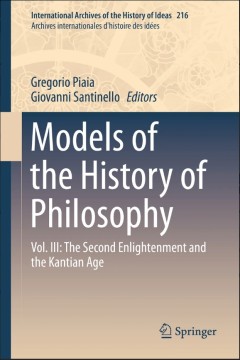
Models of the History of Philosophy:Vol. III: The Second Enlightenment and th…
This is the third volume of Models of the History of Philosophy, a collaborative work on the history of the history of philosophy dating from the Renaissance to the end of the nineteenth century. The volume covers a decisive period in the history of modern thought, from Voltaire and the great “Encyclopédie” of Diderot and d'Alembert to the age of Kant, i.e. from the histoire de l'esprit hu…
- Edition
- 1
- ISBN/ISSN
- 978-94-017-9965-2
- Collation
- XXXII, 1000
- Series Title
- International Archives of the History of Ideas Archives internationales d'histoire des idées
- Call Number
- -
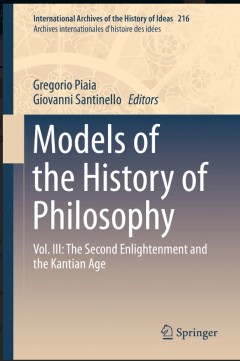
Models of the History of Philosophy:Vol. III: The Second Enlightenment and th…
This is the third volume of Models of the History of Philosophy, a collaborative work on the history of the history of philosophy dating from the Renaissance to the end of the nineteenth century. The volume covers a decisive period in the history of modern thought, from Voltaire and the great “Encyclopédie” of Diderot and d'Alembert to the age of Kant, i.e. from the histoire de l'esprit hu…
- Edition
- 1
- ISBN/ISSN
- 978-94-017-9965-2
- Collation
- XXXII, 1000
- Series Title
- International Archives of the History of Ideas Archives internationales d'histoire des idées
- Call Number
- -
 Computer Science, Information & General Works
Computer Science, Information & General Works  Philosophy & Psychology
Philosophy & Psychology  Religion
Religion  Social Sciences
Social Sciences  Language
Language  Pure Science
Pure Science  Applied Sciences
Applied Sciences  Art & Recreation
Art & Recreation  Literature
Literature  History & Geography
History & Geography